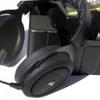The musical side of HS70
The musical side of HS70
The HS70 performs well in music, especially taking into account that it’s a gaming headset. With a balanced EQ setting in Corsair’s iCUE software, the headset provided a strong and dynamic bass, clear vocals, and good sound reproduction. It’s best to:
- Select pure direct mode
- or add a new profile and manually configure the equalizer, then
- Save it as the default profile
I didn’t use the 7.1 mode as, in my opinion, it made the sound worse than in stereo. As for the testing suite, we used the following songs:
- 2Pac - How Do U Want It
- Eric Clapton - Tears In Heaven
- Guns N' Roses - Welcome to the Jungle
- Limp Bizkit – Boiler
- Missy Elliott - Get Ur Freak On
All tracks are listened to lossless in FLAC, or taken from Spotify (320 kbps) and, as you can see, we covered a variety of genres. The HS70 makes the bass sound great (it isn’t under or over-represented), instruments sound natural, and vocals are nearly perfect (maybe just a bit too warm). Low-end instruments like the bass guitar and drums were reproduced with depth and fullness. Bass drum reproduction is sufficiently clear, for this price segment. The mid-range is warm by default, and it suited me. The soundstage and resolution are also good. Vocals, acoustic and electric guitars and pianos came through clearly. Resonance felt natural, especially for pianos and guitars. Only midrange vocals lacked a little bit of warmth. Upper-end had a small issue with treble. It felt too sharp at times, but high-hat clashes and higher-range instruments were clear. Corsair Gaming HS70 has a V-shaped characteristic (quite common for gaming headsets), with sufficient bass and treble combined with a lesser midrange. Audiophiles may prefer a more neutral sound, but if you are one, you are not the target demographic for this reviewed headset. There is one drawback - the headset is a bit lacking in the clear distinction between bass and treble ranges. After small EQ optimization, the sound definitely improves though and this was needed especially for the high frequencies, as they’re amplified too much (making the sound metallic and sharp). Overall the HS70 provided a very decently detailed sound. It surprised me how good the sound staging and capabilities were, with enough depth and direction. The entire audible range was present and relatively clean, transitions between them could have been smoother, though they were acceptable. In music, instruments are not lost, but sometimes some started becoming harder to identify. Frequency ranges were separated but defined. Summing it up – we cannot complain really.

